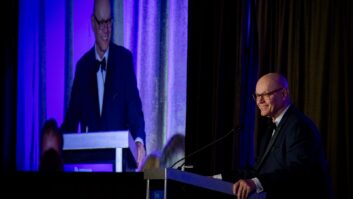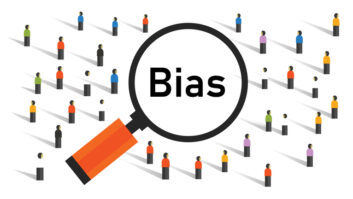
Bob Pittman of Clear Channel, at right on screen, appears on a CNBC program discussing the deal. Four years ago or so, I suggested that leaders of U.S. commercial radio should face reality and work out a mutually satisfactory relationship with music labels in which the labels and artists felt fairly compensated for their work.
Then and subsequently, I heard back from performance royalty “hawks” who felt that radio should never compromise with artists and labels, who said the historic arrangements worked just fine, that artists got all the compensation they needed through on-air exposure, and that record companies were simply trying to rescue their own “failed business model” by pushing for revenue sharing through voluntary or legislated means.
The hawks maintained this posture in the face of relentless change in the entertainment landscape, the evolution of new platforms and the constant threat that Congress would step in and force a new solution on radio.
So I’ve been pleased as radio groups, led through the door by Clear Channel, started to explore new relationships with labels, setting up direct arrangements to the satisfaction of both sides. Slowly, the temperature of the dialogue has cooled.
To me, this change was not a concession by radio but rather a clear-eyed business decision. Radio, labels and artists need one another. Operating in a constant state of conflict benefits none of them.
BIG DEAL
Now comes the news that Warner Music Group — one of the biggest labels, though not the biggest — has agreed to a strategic alliance with Clear Channel under which WMG will share in Clear Channel revenue from all platforms. (Warner Music Group is parent to a family of record labels with names like Atlantic, Big Beat, Elektra, Nonesuch, Reprise, Rhino, Rykodisc and Sire.)
The two companies described this as “the first wide-ranging strategic alliance between a major music company and Clear Channel.” It certainly is that. I see it as even more. It likely will act as a model and a prompt. It provides further permission — even pressure — on other radio companies and labels to come to the table. And no doubt other huge labels Universal Music Group and Sony Music Entertainment will be obliged to look closely at deals with Clear Channel.
At last, the smoke on this battlefield is settling.
As CC and Warner Music put it, this deal aligns their mutual interests “in driving digital growth, increasing radio listenership, breaking new music and creating new marketing opportunities for established artists.” The pact includes provisions to help encourage and promote new music, as well as “targeted user interfaces in digital” that are supposed to make it easier for consumers to buy music when they hear it.
Clear Channel of course has a lot to offer to a marketing partner: hundreds of stations, millions of radio users and digital consumers, thousands of events, outdoor billboards. Not all broadcasters can offer so much; but just as CC’s deal with Big Machine Label Group opened the door a crack, this agreement surely will encourage more radio/label harmony. (Ironically, this news came in the same week that various big record companies including Warner sued SiriusXM Radio in a royalty dispute.)
So these days, instead of having to endure carping Tweets from radio advocates and angry musicians accusing one another of ripping each other off and bashing each other’s “declining business models,” we get to hear CeeLo Green and Bob Pittman singing one another’s praises, using words like “thrilled to be their partner” and “win for all parties.”
Of course, only last September Leslie Moonves of CBS was quoted as saying that paying artists for radio airplay is “absurd.” And to be clear, the Clear Channel/Warner announcement doesn’t deal directly with the debate over performance royalty legislation. Further, what’s good for Clear Channel isn’t necessarily good for thousands of smaller broadcast owners, who must navigate their own paths in an evolving competitive landscape.
But just as clearly, this sort of agreement eventually will make such discussions irrelevant. Frameworks are being built under which our industry at large will enjoy a longer-term, fruitful relationship with content creators.
As Pittman put it, “Old formulas don’t work as well as they must in the digital age … Today, music companies and media and entertainment companies need to be more supportive of each other’s needs.” Hear hear.
What do you think? Write me at [email protected] and I’ll share your thoughts with fellow readers.







